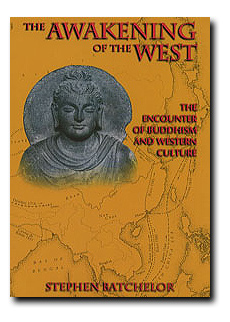|
A Review of The Awakening of the West: The Encounter of Buddhism and Western Culture
by Stephen Batchelor. London: Aquarian, 1994, xvi, 416 pages
ISBN 0-938077-69-4 buy this book now
Reviewed by Adriano Lanza
source: Jounal of Buddhist Ethics, Vol 3, 1996

In 1994, a very interesting book by Stephen Batchelor was published entitled The Awakening of the West (in the Italian translation it is Il Risveglio dell'Occidente [Ubaldini Editore, Roma, 1995]). The topic, Buddhism meeting Western culture, is the same one that had been the object of a book published over forty years ago with the title La rencontre du Bouddhisme et de l'Occident (1952), written by the Jesuit priest Henry de Lubac.
The two books share the same purpose, both trying to convey a far-ranging and close to complete view from ancient times to the present day. But the two authors'  points of view are different. De Lubac acknowledges the positive values of Buddhism, especially on the level of ethics. But in all, he does not consider it compatible with the Christian faith. Batchelor, on the other hand, does not merely observe the Buddhist phenomenon from the outside, but from within--he himself experienced being a Buddhist monk who later returned to the laity. Nonetheless, it is very useful to compare the two books. points of view are different. De Lubac acknowledges the positive values of Buddhism, especially on the level of ethics. But in all, he does not consider it compatible with the Christian faith. Batchelor, on the other hand, does not merely observe the Buddhist phenomenon from the outside, but from within--he himself experienced being a Buddhist monk who later returned to the laity. Nonetheless, it is very useful to compare the two books.
By and large, Batcherlor's interpretation is carried out according to five different attitudes held by the West towards Buddhism: (1) That of basic indifference, except for the occasional incident in ancient times, which endures until the thirteenth century; (2) That of a prejudicial rejection, almost constantly maintained until late eighteenth century; (3) The rationalist view, which held Buddhism to be an object of scientific research and study until the nineteenth century; (4) The view which, at the same time, includes a romantic infatuation with the East; (5) The attitude which, at the beginning of the twentieth century, gives rise to the formation of meditation groups that practice in the West.
At the beginning both authors deal with the relations, either real or presumed, between the Buddhist and the Greek-Hellenistic world, and they acknowledge a conceivable Buddhist influence upon the gnosticism of early Christian times. They both dwell upon Manicheism as well, which recognized the Buddha as one of the great messengers dedicated to enlighten mankind.
Next, they both deal with the news that reached Europe through the reports of the great travelers during the Middle Ages. Among them Marco Polo stands out, and later such Jesuit missionaries as Francesco Saverio and Matteo Ricci, who hoped to convert the "idolaters." Batchelor, who often gives many cross-references between the past and present, points out how the attitude of the Catholics towards Buddhism has changed, especially that of some contemporary Jesuits. Among them Batchelor mentions Father Hugo Enomiya-Lassalle, who asserts the value of Zen practice which, in his opinion, can be of great profit to Christians. But Batchelor questions whether considering Zen experience as a neutral one, interpretable according to one's philosophical or religious preferences, is really compatible with the Buddha's Dharma, in which the experience of enlightenment springs from a context of thought and action to which it is deeply interconnected.
With this historical presentation we realize that it was only in the last century that a serious study of Buddhism was undertaken with a knowledge of the idioms used in Buddhist literature. Both Batchelor and de Lubac appreciate the unique importance of Eugene Burnouf's work, thanks to which Buddhism became the object of scientific research and managed to stir up interest among a wider audience.
Batchelor too like de Lubac, dwells on Schopenhauer, who, as we know, was pleased to find a close resemblance between his doctrine and Buddhism.
Among those who, at the time, were interested in Buddhism, Batchelor especially recalls Wagner and Nietzsche. Neither Batchelor nor de Lubac seems to greatly appreciate the appropriation of Buddhism by theosophists and occultists.
Both authors try to explain the attraction exercised by Buddhism on the West--and by the Eastern doctrines in general--by citing the spiritual vacūm which was the cause of a crisis in the traditional Christian forms, as well as the overwhelming scientific and technological progress. However, while de Lubac fears the coming of a spiritual colonization in Europe, Batchelor sees the entry of the Dharma in the West favorable. This is confirmed by the fact that nowadays Buddhism is practiced in Europe with teachers trained in the classic traditions. Nevertheless, it remains a period of transition, since Buddhism has yet to develop a peculiarly European, or rather Western, identity.
|
Search thezensite
Updates to thezensite
Zen Book Reviews
Miscellaneous & Reading Lists
Book Sources
Zen Links
Journals and Acedemic Sites of Interest
Miscellaneous
Non-Zen Topics
Essays of Interest
Interesting Sites
Miscellaneous
humour
art
If you wish, you may make a small donation to help this site defray overhead costs.
Thank you.
|

